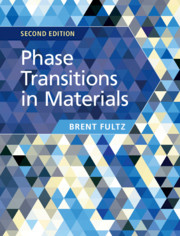Book contents
- Frontmatter
- Contents
- Preface
- Notation
- Part I Basic Thermodynamics and Kinetics of Phase Transformations
- Part II The Atomic Origins of Thermodynamics and Kinetics
- Part III Types of Phase Transformations
- 11 Thermodynamics and Phase Transitions at Surfaces
- 12 Melting
- 13 Solidification
- 14 Phase Transformations with Interfaces: 1. Microstructure
- 15 Phase Transformations with Interfaces: 2. Energetics and Kinetics
- 16 Spinodal Decomposition
- 17 Phase Field Theory
- 18 Method of Concentration Waves and Chemical Ordering
- 19 Diffusionless Transformations
- 20 Thermodynamics of Nanomaterials
- 21 Magnetic and Electronic Phase Transitions
- Further Reading
- References
- Index
14 - Phase Transformations with Interfaces: 1. Microstructure
from Part III - Types of Phase Transformations
Published online by Cambridge University Press: 24 April 2020
- Frontmatter
- Contents
- Preface
- Notation
- Part I Basic Thermodynamics and Kinetics of Phase Transformations
- Part II The Atomic Origins of Thermodynamics and Kinetics
- Part III Types of Phase Transformations
- 11 Thermodynamics and Phase Transitions at Surfaces
- 12 Melting
- 13 Solidification
- 14 Phase Transformations with Interfaces: 1. Microstructure
- 15 Phase Transformations with Interfaces: 2. Energetics and Kinetics
- 16 Spinodal Decomposition
- 17 Phase Field Theory
- 18 Method of Concentration Waves and Chemical Ordering
- 19 Diffusionless Transformations
- 20 Thermodynamics of Nanomaterials
- 21 Magnetic and Electronic Phase Transitions
- Further Reading
- References
- Index
Summary
Most solid-to-solid phase transformations are much more interesting than just the growth of a small, homogeneous particle of the new phase. For reasons of both kinetics and thermodynamics, the new particles evolve in crystal structure, chemical composition, interface structures, defects, elastic energies, and shapes. Chapter 14 gives an overview of processes that occur during the nucleation and growth of a new phase from a parent phase. It covers essential features of precipitation in a solid, with a few traditional examples from steels, such as the pearlite transformation, and examples of precipitation sequences in aluminum alloys. Much of the content is central to physical metallurgy. The Kolmogorov-Johnson-Mehl-Avrami model of the rates of nucleation and growth transformations is presented. The late-stage coarsening process is also discussed in terms of the self-similarity of the microstructure.
Keywords
Information
- Type
- Chapter
- Information
- Phase Transitions in Materials , pp. 373 - 397Publisher: Cambridge University PressPrint publication year: 2020
